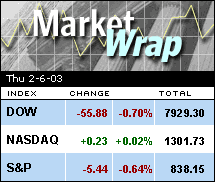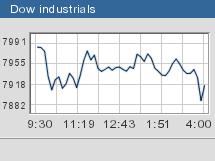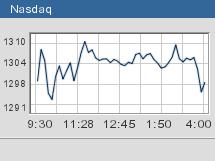NEW YORK (CNN/Money) -
Investors will have some key jobs data to consider Friday, after a broad market retreat Thursday, and the major indexes need huge gains to end the week up after three consecutive days of declines.

Concerns about tensions in Iraq and Korea and some weak economic data handed the Dow and S&P another day of losses Thursday.
The Dow Jones industrial average (down 55.88 to 7929.30, Charts) fell 0.7 percent, closing at its lowest point since Oct. 14, while the Standard & Poor's 500 index (down 5.44 to 838.15, Charts) lost 0.6 percent. The Nasdaq composite (up 0.23 to 1301.73, Charts) teetered near positive territory throughout the day, eventually closing virtually unchanged. All three indexes would need to make significant gains Friday to end the week on an up note.
Investors will get another dose of the state of the job sector Friday after the Labor Department Thursday said the number of Americans filing new claims for unemployment benefits fell to 391,000 in the week ended Feb. 1 from a revised 402,000 the preceding week. Economists surveyed by Briefing.com expected a drop to 390,000 new claims.

The government is scheduled to report key monthly numbers on unemployment and payroll growth in January before the opening bell Friday. Economists, on average, expect unemployment to stay at 6 percent and non-farm payrolls to grow by about 69,000 jobs -- compared with a loss of 101,000 jobs in December. Hourly earning are forecast to have gained 0.3 percent after rising the same amount in the previous month.
"The employment report is one of the key indicators for figuring out if the consumer can hold on," said Jack Ablin, chief investment officer at Harris Trust. "We're trying to transition this economy away from the consumer, but this potential war is getting in the way. We have to keep consumer spending going until corporate executives are able to make decisions regarding corporate spending."
Friday also brings the latest report on wholesale inventories. Economists expect inventories rose 0.2 percent in December, in line with the prior month, according to a survey by Briefing.com.
On Thursday, the Labor Department said its initial reading on fourth-quarter productivity showed a dip of 0.2 percent, compared with a 5.1 percent increase in the third quarter. Economists had expected a rise of 0.7 percent, according to a consensus of economists surveyed by Briefing.com. But for 2002 as a whole, productivity rose 4.7 percent.
"Productivity has been a feather in our cap for quite some time, so [the drop] is viewed as a disappointment," said Bryan Piskorowski, market analyst at Prudential Financial.
War worries cloud Wall Street
"You have nobody willing to be a hero here -- it's hard for people to step up to the plate," Piskorowski added. "Trade over the past two sessions has been very speculative. If you removed Iraq, you'd probably have a market that was doing OK."

Investors continued to digest reaction to remarks made by Secretary of State Colin Powell Wednesday to the United Nations Security Council asserting Iraqi President Saddam Hussein has tried to hide weapons of mass destruction.
Newspapers in Germany and France, both of which have expressed the desire to give U.N. inspectors considerably more time in an attempt to avoid war, did not provide an indication of any change of mind from either government after Powell's comments.
Powell testified again today on Iraqi compliance with U.N. weapons inspections, this time before the Senate Foreign Relations Committee.
After the markets closed, President Bush said he would accept a second United Nations resolution on Iraq.
Tensions in North Korea also grew as the Asian country warned a pre-emptive attack by the United States on its nuclear facilities would lead to a "full-scale war."
Retail sales mixed
Some soft January sales reports snagged retailers, despite some positive guidance for the quarter.
No. 1 retailer Wal-Mart (WMT: up $0.05 to $46.79, Research, Estimates) posted a gain of 2.3 percent in sales at stores open at least a year, also known as same-store sales. That number is on the low end of the company's 2 to 4 percent expected growth range. The company also said earnings per share for 2002 would be about 2 cents better than analysts expected.
J.C. Penney (JCP: down $0.35 to $18.89, Research, Estimates) guided higher for the quarter despite a slip in January sales, while Gap (GPS: up $0.55 to $15.53, Research, Estimates) and Costco (COST: up $0.25 to $28.95, Research, Estimates) were among retailers posting same-store sales gains for the month.
But Sears (S: down $2.23 to $23.31, Research, Estimates), the nation's No. 2 general retailer, said its sales at stores open at least a year fell 8 percent for the month, and warned its first-quarter earnings would fall well below analyst estimates. Federated (FD: down $0.76 to $24.70, Research, Estimates) and Target (TGT: down $0.67 to $27.20, Research, Estimates) also reported a decline in same-store sales.
Meanwhile, Swedish wireless equipment maker Ericsson (ERICY: up $0.53 to $7.25, Research, Estimates) gave a lift to telecoms after the firm named a new CEO and president. Carl-Henric Svanberg, currently CEO of the world's leading lock maker, Assa Abloy, was set to take the helm from current CEO Kurt Hellstrom April 8.
In the last hour of trading, homebuilder shares slipped after Toll Brothers (TOL: down $0.81 to $19.23, Research, Estimates) said its first-quarter contracts rose, but warned that "deposits have not kept pace with traffic." The company also made some negative comments in a conference call. Shares of Beazer Homes (BZH: down $2.02 to $55.08, Research, Estimates) and Hovnanian (HOV: down $0.98 to $29.45, Research, Estimates) also fell on the report.
Most European markets ended lower, despite getting a push from the surprise decision by the Bank of England to cut interest rates to 3.75 percent from 4 percent, a move made in anticipation of continued weakness in the global economy.
Asian-Pacific stocks also closed down Thursday amid new jitters about Iraq and North Korea.
Treasury prices rose, sending the 10-year note yield down to 3.94 percent from 4.01 percent late Wednesday. The dollar fell against the yen and the euro, retreating from the previous session's gains.
Light crude oil futures for March delivery gained 23 cents to $34.16 a barrel. Gold for April delivery fell $6.50 an ounce to $370.70.
Market breadth was negative. On the New York Stock Exchange, decliners beat advancers nearly 2 to 1 as 1.4 billion shares changed hands. On the Nasdaq, losers beat winners 3 to 2 as 1.2 billion shares traded.

|

